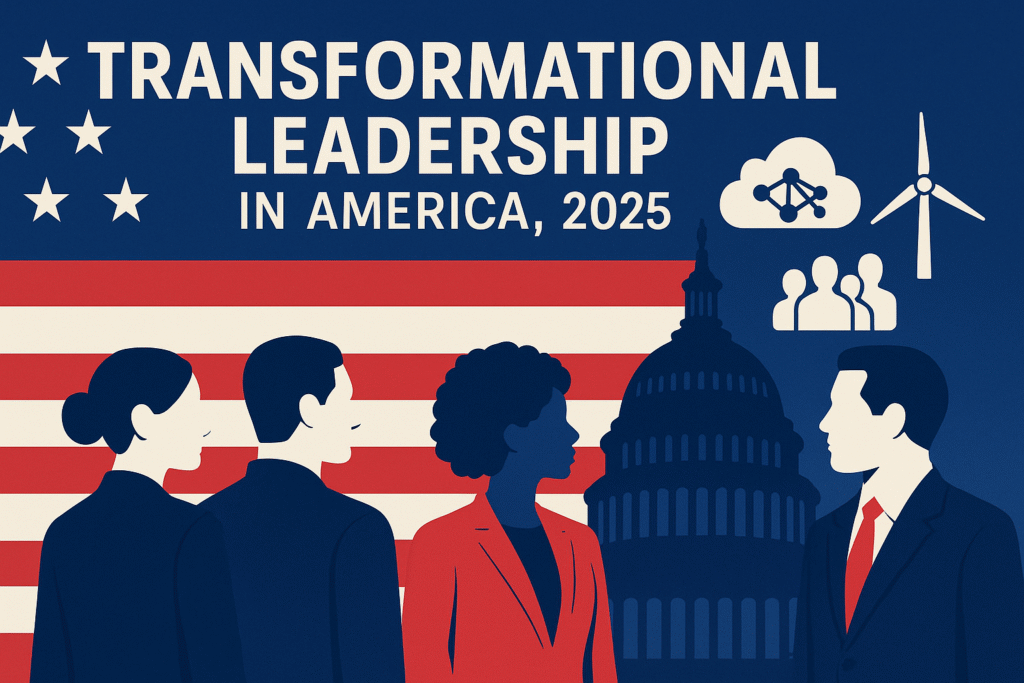Introduction: Leadership at an Inflection Point
As someone who has studied leadership for years, I can say with conviction: never in modern history has the American leader’s role been so complex, and so consequential.
In 2025, transformational leadership in the U.S. means much more than inspiring speeches or strategic brilliance. It requires trust-building in an era of institutional skepticism, ethical clarity in the face of rapid AI adoption, and inclusive visioning in a diverse yet polarized society.
Gallup reports that only 27% of Americans trust their government (Gallup, 2024), while Pew surveys show widening political polarization (pewresearch.org). Against this backdrop, transformational leadership is not just desirable — it is indispensable.
Defining Transformational Leadership in the American Context
Traditionally, transformational leaders are defined as those who:
-
Inspire vision and purpose, beyond short-term gains.
-
Motivate and empower others, fostering ownership of outcomes.
-
Lead ethically, embodying trust and integrity.
-
Encourage innovation, adaptability, and resilience.
In the American context of 2025, this expands to include:
-
Bridge-building: fostering bipartisan cooperation in a fractured political climate.
-
Digital fluency: leading responsibly in AI, automation, and data-driven governance.
-
Equity and inclusion: ensuring leadership reflects and serves the full diversity of America.
-
Resilience under crisis: leading with calm and clarity through pandemics, climate disasters, and economic volatility.
Trends Shaping U.S. Transformational Leadership in 2025
-
The AI & Digital Revolution
American companies dominate the AI frontier. Leaders must harness this responsibly — balancing innovation with ethics, regulation, and workforce transition. Korn Ferry notes that executives see AI as the single most transformative force in leadership over the next decade (kornferry.com). -
Workforce Expectations
Employees are demanding purpose, flexibility, and wellbeing. Deloitte’s 2025 Human Capital Trends report highlights the tension leaders face between automation and humanity, efficiency and empathy (deloitte.com). -
Diversity, Equity & Inclusion (DEI)
Horton International emphasizes that inclusive leadership is no longer optional; it is a competitive advantage in a diverse, globalized economy (hortoninternational.com). -
Crisis Leadership
Whether it’s wildfires, hurricanes, or public health crises, U.S. leaders must be agile, adaptive, and resilient — capable of turning crisis into opportunity.
Case Studies: American Leaders in Action
-
Operation Warp Speed (2020–21)
A remarkable public-private partnership where U.S. leaders demonstrated speed, collaboration, and trust in science, delivering COVID-19 vaccines in record time. -
Satya Nadella (Microsoft)
Nadella has reshaped Microsoft by emphasizing empathy, inclusivity, and innovation — embodying a transformational style that U.S. political leaders could learn from. -
Marc Benioff (Salesforce)
A strong advocate for stakeholder capitalism, Benioff has linked corporate success with societal wellbeing, making the case for purpose-driven leadership. -
Detroit’s Local Leadership
Detroit’s recovery after bankruptcy illustrates how community-rooted transformational leadership can regenerate trust, economic opportunity, and urban resilience.
Challenges for American Transformational Leaders
Despite these examples, obstacles abound:
-
Polarization: Political gridlock undermines long-term vision.
-
Trust deficit: Erosion of faith in institutions constrains legitimacy.
-
Short-termism: Quarterly earnings pressures and election cycles discourage long-term planning.
-
Leader burnout: Constant crises strain leaders’ wellbeing.
-
Equity gaps: Women and minorities remain underrepresented at top levels of leadership.
Policy and Practice Recommendations
-
Institutionalize Leadership Training
Federal and state programs should embed transformational leadership into governance and corporate leadership pipelines, with modules on ethics, AI, and DEI. -
Promote Bipartisan Leadership Councils
Establish forums where business, civic, and political leaders collaborate across divides. -
Embed Equity in Leadership Pipelines
Ensure women, minorities, and underrepresented groups have access to leadership development opportunities. -
Mandate Transparent AI Governance
Leaders must guide AI adoption responsibly — protecting privacy, jobs, and ethics. -
Support Leader Wellbeing
Policy frameworks should recognize and resource mental health and resilience for leaders at all levels. - Conclusion: Leadership that America Needs
After many years of observing leadership from boardrooms to the White House, I can state: the transformational leader in America in 2025 must be visionary yet grounded, digitally fluent yet human-centered, inclusive yet decisive.
Such leaders will not only guide their organizations but also rebuild trust in American institutions and demonstrate to the world that democracy, innovation, and diversity remain America’s greatest strengths.
References
-
Gallup (2024). Trust in Government Remains Near Historic Lows. (gallup.com)
-
Deloitte (2025). Global Human Capital Trends. (deloitte.com)
-
Korn Ferry (2025). Top 5 Leadership Trends. (kornferry.com)
-
Horton International (2025). Leadership Trends for 2025. (hortoninternational.com)
-
DDI (2025). Global Leadership Forecast. (ddi.com)
- AI and ChatGPT Assistance
Check out the GTF Research
Check out events
Connect with us on facebook
connect with us on linkedIn
Check out the American Transformation forum
